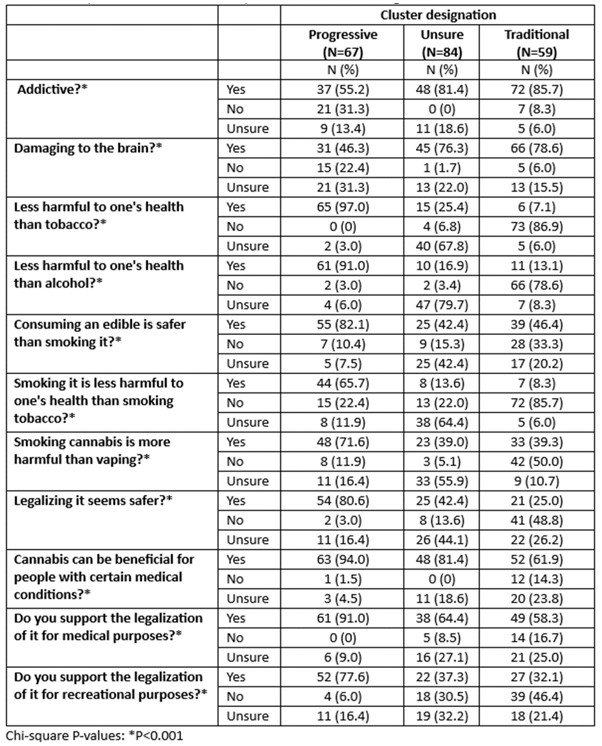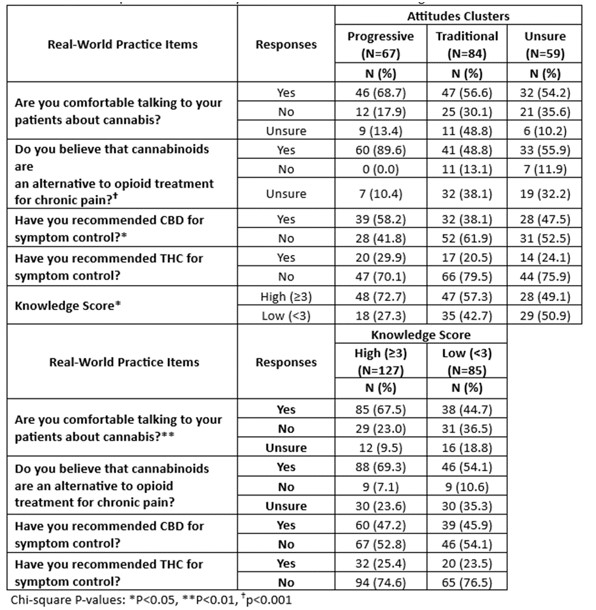Session Information
Session Type: Poster Session A
Session Time: 10:30AM-12:30PM
Background/Purpose: Rheumatologists care for difficult to manage chronic diseases, necessitating adjustments to new treatments and evolving patient views. When making treatment decisions, rheumatologists incorporate clinical data, established medical care, and patient-centered ownership of their condition(s). With rising cannabis use among rheumatologic patients, understanding rheumatologists’ cannabis knowledge, attitude, and practice (KAP) is critical.
Methods: This anonymous cross-sectional survey targeted international rheumatologists and allied health providers caring for rheumatology patients. Participants responded to questions about THC-specific cannabis attitudes (11 questions; Yes/No/Unsure), knowledge (6 questions; single correct answer), and real-world practice (4 questions, Yes/No). Two-Step cluster analysis in SPSS identified clusters using likelihood distance and categorized respondents on their answers to the cannabis attitude-related questions. Cluster names were based on a previous study of physicians.1 Knowledge scores were computed by summing correct answers and dichotomizing at the mean. Practice questions focused on comfort discussing cannabis, viewing cannabinoids as opioid alternatives for chronic pain, and recommending cannabidiol (CBD) and/or THC for symptom control. Chi-square examined effects of attitudes and knowledge on the practice outcomes.
Results: Of 219 respondents, most were rheumatologists from Canada (N=97), predominantly female (N=135), & over the age of 50 (N=110). Three attitudes’ clusters were identified: Progressive (31.9%; high level of openness to THC), Unsure (28.1%; uncertain about attitudes towards THC), and Traditional (40.0%; a more conservative view towards THC) (Table 1). Knowledge ranged from 0-6 and dichotomized into Low (< 3.0; 40.1%) and High (≥3.0; 59.9%). Those in the Progressive cluster had higher knowledge scores (P< 0.05), believed that cannabis could be an alternative treatment to opioids (P< 0.001) and have recommended CBD to patients (P< 0.05) more often than the Unsure and Traditional clusters (Table 2). Participants in the high knowledge group were more comfortable speaking to patients about cannabis (P< 0.01).
Conclusion: This study highlights significant knowledge gaps among rheumatologists, with scores averaging below 50%. Despite this, there’s openness toward discussing cannabis with patients. Diverse attitudes towards the role of cannabis underscore how perspectives shape practice. These findings underline the need for targeted educational programs to improve understanding and clinical application of cannabis, ensuring practitioners can conduct informed dialogues with patients as cannabis use increases in therapy.
1. Zeiger JS, et al. Ann Allergy, Asthma Immunol. 2022;129(4):441-450.
To cite this abstract in AMA style:
Zeiger J, Katz P, Fitzcharles M, Kassan S, Simon T, Michaud K. Knowledge and Attitudes About Delta-9-tetrahydrocannabinol (THC) Impact Real-world Practice in an International Group of Rheumatologists [abstract]. Arthritis Rheumatol. 2024; 76 (suppl 9). https://acrabstracts.org/abstract/knowledge-and-attitudes-about-delta-9-tetrahydrocannabinol-thc-impact-real-world-practice-in-an-international-group-of-rheumatologists/. Accessed .« Back to ACR Convergence 2024
ACR Meeting Abstracts - https://acrabstracts.org/abstract/knowledge-and-attitudes-about-delta-9-tetrahydrocannabinol-thc-impact-real-world-practice-in-an-international-group-of-rheumatologists/


